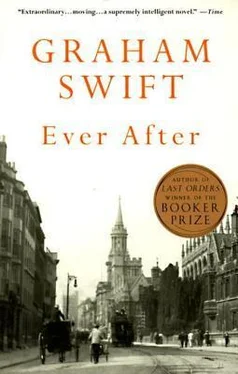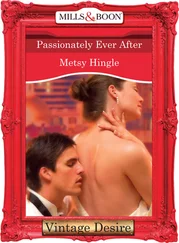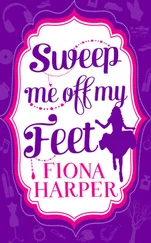Why did he have to tell me? He rings me up, here in my Fellow’s fastness. He wants to come and see me. There is something he wants to talk about. He won’t say what. His voice, on the telephone, is not quite the voice of the Sam I know, and I picture, accompanying it, a cloudy, untypical constriction of the features. When, finally, he climbs the staircase to my room and I open, to his knock, my impressively sturdy oak door, the countenance I see before me — somehow I am not surprised, if I am nonetheless unnerved, by this — directly recalls the countenance of Sam some eight months before, about to have his last interview with his wife. It is the face of a man about to go into battle; and just for a moment, though it has nothing to do with the proceedings of this day, I am palpably sure I have seen, in the face of the sixty-seven-year-old Sam, the face of the nineteen-year-old Ed — trying to summon up saliva, shifting in his cockpit.
His car pulls up at the college gates. He dismisses his chauffeur for several hours. There is every reason to mark the occasion in style. This, after all, is one of the college benefactors entering the College for the very first time. A welcoming party; an invitation to high table. But by some prior arrangement (and much as he might have revelled in it), he seems expressly to have vetoed such ceremony. This is a personal visit, on private business; he is travelling incognito. A correct porter, in bowler hat, leads him to my staircase (I am watching all this from an upper window that overlooks the court). He follows, looking around him uncertainly. He is wearing, of course, his best traditional, sober English suit — which doesn’t suit him. When I hear him mount my stairs, which are of ancient, spiralling stone and have an ecclesiastical smell, I imagine his footsteps to have a penitent’s faltering heaviness.
You see, I think, astonishing as it seems, that he is coming, after all these years, to apologise ; to make a clean breast of it: not bidding me go to him, but coming and knocking humbly on my door. My mother is dead. He has had time to think it over. He is here (Claudius at his prayers) to atone for his part in my father’s death.
It is a bright, smiling day in the early part of May. The sunshine frustrates him. He has envisaged, perhaps, a certain austere solemnity appropriate to his plainly serious purpose, aided by what he supposed would be the monkish atmosphere of an ancient college. He had not imagined windows flung open and sparrows chirruping under the eaves. And, there, from across the court — scarcely has he entered and had time to survey, with a mixture of respect and dismay, my scholarly chamber — comes the plain sound of a female giggle. He says, as the curtains billow and warm air sidles in: “Look — er — can we take a walk or something? Why don’t you show me around this place?”
So we wander through the adjacent colleges: around cobbled courts and vivid lawns, through shadowed archways and sun-pierced passages. He waits — and waits — for his moment, while I play the part of the patient guide. He is duly impressed, even awed (this is the latter-day Sam) by the air of treasured antiquity, of sacred space. So this is where he has put me. This is where — out of spite or charity — he has had me interred. “They treat you okay here?” he says, as if we are in some grand hotel and, depending on my answer, he will have words with the manager. About his whole bearing there is something parodically suggestive of the munificent father coming to see his son at some high-class boarding school. And yet it is Sam who, for all his years, has the look of a timorous boy.
We walk, skirting carpets of greensward, by the willow-hung, punt-cluttered river. The scene is a vernal idyll. This is the time of year when academic cussedness dictates that the youth of the university should shut itself away to swot for exams, just when its young blood should be pulsing to the joys of spring; and when the youth of the university naturally defies the injunction. There is a general sprawling on grass; couples fondling; flimsy attire; river-borne frivolity. Sam takes this in too. No, he hadn’t expected these — distractions. It seems to make it so much harder for him to get to his point.
Then, in a flash, I revise my theory of his unspoken purpose and chide myself for being so obtuse. Of course! Everything around us is spelling it out. These ancient confines; these young limbs. This other-worldliness; this earthly delight …
He is going to tell me he is going to remarry. It doesn’t surprise me. I wonder who. But does it matter? Some creature less than half his age who has her hooks firmly into him and whom Sam doesn’t mind, not in the least, being hooked into by.
January — and May.
And, of course, he would feel guilty about it, doubly guilty — my mother barely eight months dead: “the funeral baked meats …” He would feel that announcing as much to me would be like putting his head right on the block.
“Sam—,” I say, to try to shorten his misery.
He registers my tone. He looks me suddenly straight and pityingly in the eye. Then he says a most un-Samlike thing.
“Can I ask you a question? A serious question. Do you think people kill themselves for love?”
A volley of laughter from a passing punt greets this inquiry. We are on one of the bridges, leaning against the balustrade. The river beneath us is a rippling ribbon of mirth.
“Sam, why are you asking me this?” I have a strange, cold feeling in my legs.
He looks at the water. “I’m talking about your pa, kid.” An American tourist, about to take a photograph at the centre of the bridge, turns and smiles heartily in our direction, no doubt having heard Sam’s Ohio tones. “But why don’t you answer the question?”
We move off the bridge.
“How should I know the answer?”
He looks at me. “If you don’t, pal, who does? Who the hell does?”
We are not far from the Fellows’ Garden. I remember that I have the key in my pocket. Without telling him, I guide him (needing guidance myself) towards the little ironwork gate. (“You got your own garden too?”) And it’s there — it’s here — that, in a fever of clenched-faced, uninterruptible disclosure, it all comes out. It’s here, under the bean tree, that he spills all the beans.
“I mean they don’t do it, do they, pal? Not in real life. Why do you think your pa did it? Because he found out about Sylvie and me, and it was all too much for him, and he couldn’t bear to go on living? If he cared that much, why didn’t he take me aside and kick the shit out of me? Why didn’t he point that goddam gun at me ? And let me tell you, if he had , I’d’ve run , I’d’ve got the hell out of there fast. You wouldn’t have seen me for dust. You wouldn’t be talking to me now. It was just a fling — Sylvie and me. If it wasn’t for— You think your Ma and me were made for each other? You think I wanted the old guy out of the way so I could pick up the winnings? That’s what you’ve always thought, isn’t it? But you’re wrong. It was just a fling. It just happened to end up lasting forty years. You see, pal, some people are just flingers. Just flingers. You see, I don’t believe in this there’s-a-girl-for-every-boy-and-a-boy-for-every-girl stuff. It’s just who you get thrown against in the trolley-car, and there’s more than one trolley-car and more than one ride. Hell — I haven’t even got to the main item. You haven’t heard anything yet.”
He looks around at the sun-filled garden, as if it’s in his power to bring a shutter down on all that he sees. He gulps for air.
“I don’t have to tell you this. I know that’s what you’re going to say: ‘You didn’t have to tell me this.’ But I’m going to tell you this. You see, I figured it was up to her. And I figured if she told you, I’d soon know about it. Then, after she died, I figured I’d give it time, in case you found something among the stuff she left you. Yeah, yeah, you found those notebooks you told me about. I’m glad you found those notebooks.” He gives me a soft, solicitous look. “Well, I’ve given it time. You see, I figured she might have meant to tell you. But she couldn’t speak , could she? She couldn’t damn well speak. So I figured it was up to me. It was damn well up to me. And don’t think I haven’t thought, over and over: I don’t have to tell him this, the kid need never know. But I’m going to tell you, because it’s the truth. The truth. And you have to tell the truth, don’t you, pal? You see, he found out. Your pa found out. Of course he found out. Were we careful ? And there was this helluva bust-up between him and Sylvie, and in the middle of it Sylvie tells him — and afterwards she tells me she’s told him — that you weren’t — that you weren’t his son. She tells him that to his face. And two days later your pa — who isn’t your pa, who never was your pa — well, you know this, pal — he goes and shoots himself.”
Читать дальше












